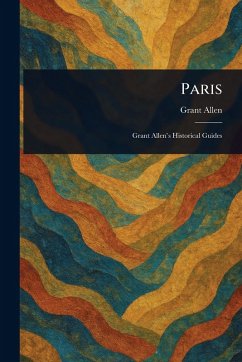Nicht lieferbar

Paris (Esprios Classics)
Grant Allen's Historical Guides
Versandkostenfrei!
Nicht lieferbar
Weitere Ausgaben:
Charles Grant Blairfindie Allen (February 24, 1848 - October 25, 1899) was a Canadian science writer and novelist, educated in England. He was a public promoter of evolution in the second half of the nineteenth century. After leaving his professorship, in 1876 he returned to England, where he turned his talents to writing, gaining a reputation for his essays on science and for literary works. A 2007 book by Oliver Sacks cites with approval one of Allen's early articles, "Note-Deafness" (a description of what became known as amusia, published in 1878 in the learned journal Mind). Allen's first ...
Charles Grant Blairfindie Allen (February 24, 1848 - October 25, 1899) was a Canadian science writer and novelist, educated in England. He was a public promoter of evolution in the second half of the nineteenth century. After leaving his professorship, in 1876 he returned to England, where he turned his talents to writing, gaining a reputation for his essays on science and for literary works. A 2007 book by Oliver Sacks cites with approval one of Allen's early articles, "Note-Deafness" (a description of what became known as amusia, published in 1878 in the learned journal Mind). Allen's first books dealt with scientific subjects, and include Physiological Æsthetics (1877) and Flowers and Their Pedigrees (1886).












